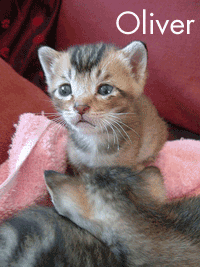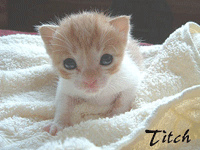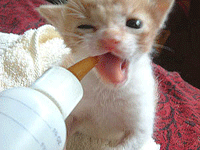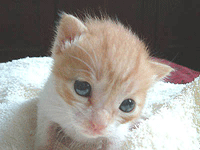|
Kitten Care
This section is a FAQ on kitten care. If you don't
find the answer here then contact us at info@hkalleycatwatch.com
|
Kitty
Tip of the week
Never
feed newborn kittens cow's milk. Cat are lactose intolerant. Use
specially formulated kitten milk only which you can purchase at
clinics and pet stores. It's also recommended that you don't give
them bacon, ham, hot dogs and smoked meats as they tend to be high
in sodium. It is also best to avoid fish products as they are higher
in magnesium - especially tuna. Go with premium brands of cat foods
whenever possible.
|
What to do if you find an abandoned kitten?
How do I hand rear a kitten
?
Maintaining the temperature
of you kitten !
Environmental Humidty !
Elimination (Urination & Defacation)
What to do if you
find an abandoned kitten?
We have heard countless stories from people that have heard and seen kittens
in distress but have chosen to walk away because they didn’t know
what to do about the situation. We received a call one day from a lady
who after hearing the screams of a 2 week-old kitten in a rubbish skip
took it home and immediately called us. That very same day, we were lucky
enough to find a foster for what turned out to be a little girl.
Luckily for all concerned, this little kitten was healthy, but more often
than not they are in extremely poor condition suffering from cat flu,
dehydration and a host of other ailments that affect recently born and
mistreated kittens.
Please don’t give up and to give you inspiration please read our
Success Stories file, and especially the story about Miracle Kitten, so
named as he survived against all odds.
Upon finding a sick kitten the best alternative is to take it to the nearest
veterinary clinic (please check Veterinary Clinics Listing). Please bear
in mind that vets charge a ‘call out fee’ outside of business
hours, which on average is HK$1000, though some clinics do operate a 24-hour
service, which we have highlighted in our Veterinary Clinics Listing page.

If you decide against this option initially, you will need to give it
some nourishment, and pet shops, providing they are still open, stock
kitten milk formula and feeding bottles. If it’s late at night and
everything is closed, try giving the kitten-sugared water, which will
ensure it receives some glucose. Be warned, kittens hate the taste of
glucose, so you might have a fight on your hands feeding it. In the absence
of a milk bottle a syringe will do the trick. You must syringe the milk
very slowly, so as not to get milk into the lungs by mistake. And in the
absence of a syringe, try soaking a tissue in the solution and very gently
wringing the solution into the kitten’s mouth and also pat some
of it around the mouth. Keep it warm. Search for a small box or tray,
and if you have a hot water bottle, wrap it in a towel and the kitten
in another towel, and lay it on top of it. Keep the ‘temporary bed’
in a dark place.
Small kittens are no different to human babies when it comes to feeding,
and whilst healthy ones will cry out, sick ones won’t. So you will
need to get up every two to three hours for feeding and to boil water
for the bottle.
Although you might be tempted to bathe the kitten, this is not recommended
for several reasons, of which the vet is in a much better position to
answer. By all means clean it up with a warm damp flannel without soap
or shampoo and dry it off immediately as it is important that the kitten
is kept warm at all times, even in the heat of summer.
How do I hand rear a kitten ?

Newborn kittens are tiny and helpless. They
are deaf, blind and totally dependent on their mother for food, warmth
and protection. Normally they are cared for by their mother. She is on
hand 24/7 to care for them and her milk changes as they grow. When confronted
with orphaned kittens first try to find a surrogate feline mother. A local
rescue organization or local vets may know of a lactating mother cat that
may take the kittens. Only if this is not possible should you attempt
to hand-rear kittens. The task of hand-rearing kittens can be daunting
- they need constant care and will put great demands on your time and
energy. At first they need to be fed every couple of hours so you will
not be getting much sleep.
Do not raise kittens simply because you feel sorry for them. Only attempt
to rear them if you plan to keep them, or they have a decent chance of
finding homes and they have a good quality of life. Even if they present
no actual problems to a hand-rearer, the overpopulation situation or local
attitudes to cat care may make it more humane to euthanize abandoned (probably
unwanted by mother cat's owner) kittens. It is far more cruel to hand-rear
a kitten and then to abandon it; hand-reared kittens are even less able
to adapt to a feral life than are kittens raised by their natural mother.
There are various reasons for hand-rearing
kittens either from birth or during development. Sometimes you need to
assist a mother in rearing her kittens i.e. supplementary feeding only.
Other reasons include:
abandoned/orphaned kittens
death, illness or incapacitation of the mother cat
mother has no milk or proven to be a poor mother
mother temporarily unable to care for kittens e.g. surgery required, short-term
illness, milk not yet dropped (more common if labour is premature)
mother rejects some or all kittens
mother has produced more kittens than she can care for unaided
an owner has insisted on aborting near-term kittens and veterinary staff
have given the kittens a chance
Note: Kittens have sometimes been successfully raised
by small nursing bitches or a non-nursing bitch has helped with the cleaning,
elimination and keeping warm aspects of kitten care. This is the exception
not the rule. If you do have such a dog, you will already know her reaction
to kittens and the extent to which she helps. Otherwise, do not tempt
fate.
Kittens do not all grow at the same rate - the figures quoted here are
averages. Some will grow faster, some will grow slower. As long as the
kitten is healthy, do not immediately panic if your kitten is not growing
at the expected rate. If you are concerned at lack of growth, seek veterinary
advice.

Not all readers will have state-of-the art facilities. Many cat-rescuers
have worked wonders using improvised equipment and sheer hard work. The
basic needs for hand-rearing are:
- Clean, warm environment
- Suitable feeding regime and feed type
- Assistance in emptying kitten's bladder and bowels
- Health care
- Common pitfalls include:
- Chilling or heat-stroke
- Dehydration
- Starvation
- Diarrhoea
Remember that newborn kittens have immature systems which are easily stressed
- their livers are poor at detoxifying drugs, their kidneys are inefficient.
They cannot store glucose for long and they cannot regulate their body
temperatures for the first few weeks. Minimising stress to their systems
is essential.

Maintaining the temperature of your
kitten
Kittens cannot control their own body temperature. They cannot shiver.
They instinctively form kitten-heaps, snuggling on and under each other
(often sliding off the top and burrowing into the bottom of the pile)
and their mother keeps them warm by having the snuggle up to her body.
Cold kittens cry for attention, but quickly become hypothermic and can
no longer cry. A kitten's temperature will also affect its ability to
feed and to digest food.
Cold kittens must be warmed up slowly. Rapid warming can be fatal. In
an emergency, newborn kittens have been warmed by holding them in warm
water (i.e. up to their necks). Kittens warmed in this way must be dried
in a warm environment.
Newborns are wet and chill rapidly as they dry. The ideal solutions are
an incubator, heat lamp (infra-red - not placed too close to kittens,
not in a small enclosed space and with care not to overheat them) or heated
pad. If these are not available, wrap a warm (not boiling) hot water bottle
or microwavable pad in a towel and lay the kittens on this. Cover them
with a section of blanket or fleece (fleecy side inwards). Fix a thermometer
inside the box to check the temperature.
Suggested kitten nests are fleece (e.g. VetBed) which must either be washable
or disposable; towels or blankets. These can be placed in a low-sided
box (disposable) or crate (washable). Initially, divide the box or crate
into compartments because very young kittens have such a strong urge to
suckle that they may start to suckle parts of each other's body, leading
to skin lesions which are an infection risk. The kittens remain in separate
compartments until they are three weeks old. After three weeks, kittens
NEED social contact and they like to huddle together. If the suckling
is still excessive and causes skin sores, separation will be necessary
for a little longer.
Caution: If using a plant propagators as an emergency
incubators, be extremely careful of the temperature; heated plant propagators,
or propagators placed on top of a heat pad, may get too hot for kittens
as the heat is not easily dissipated.
Note: A kitten with a body temperature below 94oF is
clinically hypothermic and likely to die/may already be dying. Its digestive
system does not function at this temperature.
Environmental Humidity
Low humidity and poor liquid intake leads to dehydration. Signs of dehydration
are poor skin elasticity and sticky mucous membranes (gums). You can determine
dehydration by the skin pinch or "tenting" test. Gently pinch
the kitten's skin around the shoulder blade. Pull it out just a little
way i.e. "tent" it. When released, it should immediately return
to normal. If it remains tented, the kitten is badly dehydrated and probably
needs injected fluids. If it returns slowly to normal, the kitten needs
rehydration fluids.
Maintaining a humidity of 55% - 65% in the incubator or nest box prevents
the kittens' skin from drying out. Humidifiers can be as simple as a shallow
dish of water or wet towel placed on a warm radiator. A steaming kettle
(be careful of boiling water) will provide instant humidity in the room,
but must be switched off and placed somewhere safe after use.
Elimination (Urination & Defecation)
Kittens cannot urinate or defecate unaided during their first
two weeks (approx). The mother normally stimulates these function by licking
their lower belly/anal region. Where the human foster mother is entirely
responsible for the kittens, this must be mimicked using moist cotton
wool or moistened tissue.
A kitten must past urine and faeces at
least once per day. Always stimulate a kitten's elimination functions
after waking it up. After each feed is also good time - since you will
be cleaning up milk spillages as it is. If they don't eliminate each time,
don't force the issue - you could abrade their delicate skin. If they
become constipated (a few do) see your vet. Very occasionally an enema
is required.
At 2 - 3 weeks old, the kittens should start controlling their own functions.
Placing them on the litter tray should trigger the reflex to urinate and/or
defecate. Leave a small amount of soiled litter in the tray to build up
a scent association for the kitten.
|
